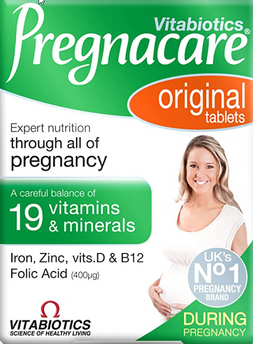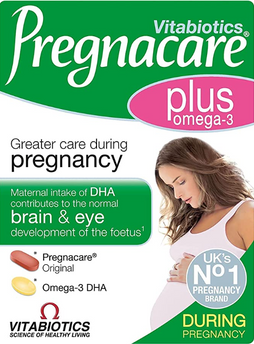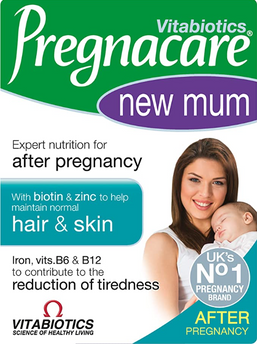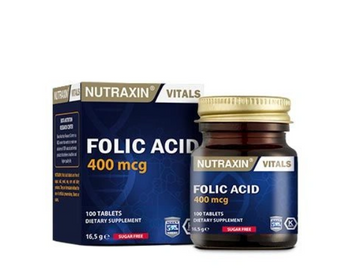Free Delivery on all Orders Over €100
Dietary supplement for pregnant women, nursing mothers and infants

Dietary supplement for pregnant women, nursing mothers and infants
Most of us get the amounts of vitamins and minerals we need through our diet. Pregnant and breastfeeding women have an increased need for certain vitamins and minerals and can benefit from nutritional supplements to cover their daily need for vitamins and minerals.
Food supplements for those who are trying to get pregnant
If you are trying to get pregnant, you should use supplements with folic acid, also called folate. Supplementation with 400 mcg of folic acid daily is recommended from the time you plan to become pregnant and throughout the first three months of pregnancy. Folate protects the fetus against, among other things, the development of spina bifida
Food supplements for you who are pregnant
Pregnant women have an increased need for vitamins and minerals and a healthy and varied diet is important. An adequate intake of nutrients is necessary to cover both the child's and the mother's need for vitamins and minerals during pregnancy. If you do not get the recommended doses through your diet, taking dietary supplements may be a good solution. If you omit important food groups from your diet, you may need to take other nutritional supplements in addition to those mentioned below.
Folic acid
Folic acid, or folate, is important for preventing spinal cord injuries. 400 micrograms per day should be used from the time you plan to become pregnant and through the first three months of pregnancy. Read more about folic acid here.
Iron
The need for iron increases during pregnancy, as the fetus needs iron, among other things, to make its own red blood cells. The iron level must be measured several times during pregnancy to check whether iron supplementation is necessary. It is important not to start taking iron without a doctor's recommendation.
Vitamin D
When you are pregnant, it is important for both you and the child that you get enough vitamin D. Vitamin D is important, among other things, because it ensures the absorption of calcium from food and drink. The recommended daily dose of vitamin D for pregnant women is 10 mcg.
Calcium
During pregnancy, the need for calcium is increased, among other things, calcium ensures that the child's skeleton develops properly. The recommended daily intake is 900 mg. More information about calcium.
Vitamin B12
Vitamin B12 is important for the formation of red blood cells and the child's nervous system. This vitamin is found in meat, fish, milk and milk products. For vegetarians, it may therefore be necessary to supplement with vitamin B12, both during pregnancy and during the breastfeeding period. Milk is the best source of vitamin B12, so if you drink enough milk to meet your calcium needs, you will probably meet your vitamin B12 needs as well.
Iodine
Iodine is necessary for the child's brain and nervous system to develop normally. Supplementation with 150 micrograms of iodine daily is recommended if you do not get this through your diet, preferably from the time you plan to become pregnant.
Omega-3 fatty acids
Omega-3 must be supplied through the diet, and especially the omega-3 fatty acid DHA (docosahexaenoic acid) is important for the normal development of the child's brain and nervous system. A daily intake of 200 mg is recommended. This fatty acid is found in fish and seafood, and supplementation is recommended if you do not have this as part of your diet.
Specially adapted nutritional supplements for pregnant women
Lifeline Care has its own nutritional supplements for you who are pregnant, where all vitamins and minerals are in the recommended amounts.
Nutritional supplements for you who are breastfeeding
As with pregnancy, a healthy and varied diet is important when breastfeeding. Infants who are fully breastfed get all their nutrition from your mother's milk, so it is important that you get the recommended amounts of the various vitamins, minerals and nutrients. Many vitamins and minerals that are important during pregnancy are also important during the breastfeeding period, both for the mother and for the child to have normal further development.
Nutrients that you must take care to get enough of:
Vitamin D
Omega-3
Iron
B-12
Iodine
Vitamin C
Dietary supplements and Vitamin D for infants
Current advice and guidelines from the Norwegian Directorate of Health regarding supplements of vitamin D and cod liver oil for infants and children:
Children who are breastfed: Should only receive supplements of vitamin D in the form of vitamin D drops already from the 1st week of life.
Children who are paralyzed: Should only receive supplements of vitamin D in the form of vitamin D drops from the 1st week of life, but the dosage should be adjusted down based on how much breast milk formula is consumed in addition.
Children receiving formula: Do not need supplements of vitamin D or other vitamins, minerals or fatty acids, as the formula already contains everything the child needs.
Cod liver oil is no longer recommended for children in the first year of life. If you want the child to consume cod liver oil, you can start with cod liver oil at the age of 1.
Previously, infants from the age of 4 weeks were recommended supplements of vitamin D, either in the form of cod liver oil or vitamin D drops, but this is no longer applicable. Read more about the new recommendations on the Directorate of Health's website here.
The recommended dosage of vitamin D drops is 5 drops daily. This corresponds to approx. 10 micrograms of vitamin D, which is the recommended intake of vitamin D for the very youngest (0-12 months).








